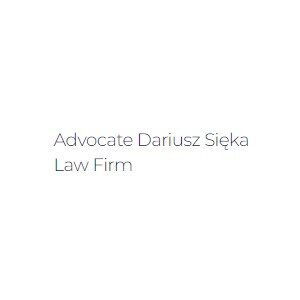Best Employment Rights Lawyers in Poland
Share your needs with us, get contacted by law firms.
Free. Takes 2 min.
Or refine your search by selecting a city:
List of the best lawyers in Poland
About Employment Rights Law in Poland
Employment rights in Poland are governed by the Labour Code, which establishes the fundamental principles and regulations governing employee-employer relationships. These rights include the regulation of work conditions, employee benefits, termination processes, discrimination protections, and more. Polish employment law is designed to ensure fair treatment for workers while providing a framework for managing workplace disputes and fostering productive work environments.
Why You May Need a Lawyer
There are several situations where individuals may require legal assistance regarding employment rights in Poland. Common reasons include disputes over unfair dismissal, discrimination issues, contract breaches by employers, disputes relating to wages and salaries, and understanding the implications of employment contracts. Additionally, navigating complaints related to workplace safety, harassment, or understanding your entitlements under Poland's labor laws can also necessitate expert legal advice.
Local Laws Overview
Polish employment law covers various key aspects essential for both employees and employers. The Labour Code mandates regulations on maximum working hours, rest periods, and minimum wage requirements. It provides comprehensive guidelines on employment contracts, probationary periods, and termination notices. Additionally, Poland endorses strong anti-discrimination policies protecting employees from biased treatment based on race, gender, disability, religion, or other attributes. Collective labor agreements and occupational health and safety standards are also integral parts of the employment law framework.
Frequently Asked Questions
What is the standard working time in Poland?
The standard working time in Poland is 8 hours per day and 40 hours per week. There are rules for flexible work arrangements and overtime, which should comply with labor laws.
How much notice is required for terminating an employment contract?
The required notice period varies according to the length of employment. Generally, it's two weeks for employees who have been employed for less than six months, one month for employment between six months and three years, and three months for employment lasting over three years.
What are the minimum wage regulations in Poland?
The minimum wage is set by the Polish government and is subject to annual adjustment. Employers are obligated to adhere to the minimum wage to ensure fair labor compensation.
Can employees request flexible work hours in Poland?
Yes, employees in Poland can request flexible working arrangements. Such requests must be negotiated with and approved by the employer, ensuring both parties can balance business efficiency and employee needs.
What protections are in place against workplace discrimination?
Poland's Labour Code prohibits discrimination based on several attributes including sex, age, disability, race, religion, nationality, political beliefs, and sexual orientation. Complaints about discrimination can be filed with labor inspectors or the courts.
Are employees entitled to sick leave?
Yes, employees in Poland are entitled to paid sick leave after providing a proper medical certificate. Employers generally pay for the first 33 days of sick leave, thereafter, the Social Insurance Institution takes over.
What maternity or parental leave benefits are available?
Polish law provides substantial maternity and parental leave benefits. Maternity leave lasts for 20 weeks and can be extended, while both parents are entitled to further parental leave maintenance.
How can an employee handle workplace harassment?
Employees facing harassment should report the conduct to their employer or HR department. If unresolved, they can contact labor authorities or seek legal intervention for further redress.
What role do trade unions play in Poland?
Trade unions in Poland play a significant role in negotiating collective labor agreements, safeguarding workers' rights, and representing employees in disputes with employers.
How are employment disputes resolved?
Employment disputes can be settled through mediation, arbitration, or conciliation procedures. If unresolved, cases can be escalated to labor courts where legal redress is pursued.
Additional Resources
If you require further information or assistance, consider seeking help from:
- State Labour Inspectorate (Państwowa Inspekcja Pracy)
- Social Insurance Institution (Zakład Ubezpieczeń Społecznych)
- Ministry of Family, Labour, and Social Policy
- Trade Unions and Employer Organizations
- Non-governmental organizations focused on labor rights
Next Steps
If you need legal assistance in employment rights, consider the following steps:
- Gather all relevant documents, including employment contracts, correspondence, and any evidence related to your situation.
- Contact an employment law attorney to discuss your case; many offer free initial consultations.
- Consider reaching out to local labor offices or unions, which may offer guidance or support.
- Stay informed about your rights and any legislative changes that may impact your situation through reputable news sources and legal publications.
Lawzana helps you find the best lawyers and law firms in Poland through a curated and pre-screened list of qualified legal professionals. Our platform offers rankings and detailed profiles of attorneys and law firms, allowing you to compare based on practice areas, including Employment Rights, experience, and client feedback.
Each profile includes a description of the firm's areas of practice, client reviews, team members and partners, year of establishment, spoken languages, office locations, contact information, social media presence, and any published articles or resources. Most firms on our platform speak English and are experienced in both local and international legal matters.
Get a quote from top-rated law firms in Poland — quickly, securely, and without unnecessary hassle.
Disclaimer:
The information provided on this page is for general informational purposes only and does not constitute legal advice. While we strive to ensure the accuracy and relevance of the content, legal information may change over time, and interpretations of the law can vary. You should always consult with a qualified legal professional for advice specific to your situation.
We disclaim all liability for actions taken or not taken based on the content of this page. If you believe any information is incorrect or outdated, please contact us, and we will review and update it where appropriate.
Browse employment rights law firms by city in Poland
Refine your search by selecting a city.












